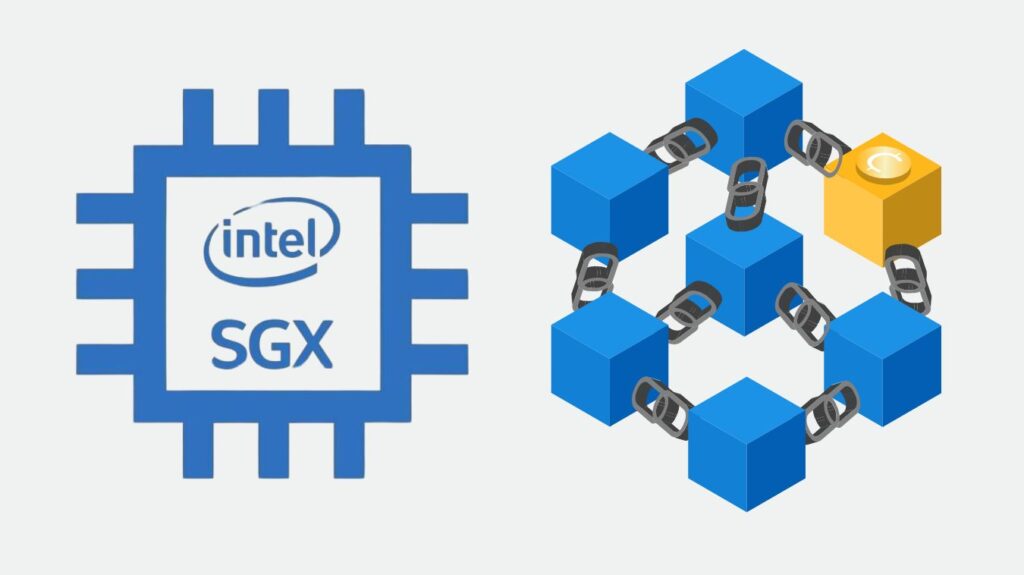The advanced technology known as Intel Software Guard Extensions (SGX) was created by Intel and consists of a collection of security-related instruction codes that are intended to run on a central processing unit (CPU). It is essential for improving computation security and integrity, especially in networks and blockchain.

Core Functionality and Trusted Execution Environments (TEEs)
- The establishment of a Trusted Execution Environment (TEE) is made possible by Intel Software Guard Extensions. Verified and trusted software can operate in safe, segregated enclaves in this environment, where external applications cannot change the code or data. The secrecy and integrity of the execution are guaranteed by this isolation.
- By isolating program execution and blocking access to external resources like networks or filesystems, the TEE offers a reliable way to run untrusted code on a global public blockchain-based operating system, improving security and deterministic execution.
Role in Consensus Mechanisms
- The Proof of Elapsed Time (PoET) consensus algorithm, first presented by Intel in 2016, is closely associated with Intel Software Guard Extensions. SGX provides the cryptographic security and randomness required for choosing the next block proposer in PoET.
- Every participating node asks a secure hardware time source inside its SGX environment for a random wait time. The Intel Software Guard Extensions environment delivers a signed certificate, or “quote,” at the end of this allotted time, verifying that the node actually waited. Following verification by pre-existing trustworthy nodes, this attestation is essential for a node to be approved into a permissioned blockchain network. By utilizing SGX, PoET provides a trusted computing model as an alternative to the computationally demanding Proof of Work (PoW) challenges.
- Proof of Luck (PoL) consensus, which attempts to decrease compute power and increase transaction throughput in comparison to PoW, is also supported by SGX. To decide which node mines the next block in PoL, Intel Software Guard Extensions is utilized to generate a “luck value,” or random number.
Benefits of Security
- By creating “immutable originality” within the network, Intel Software Guard Extensions aids in thwarting Sybil assaults by separating trustworthy areas of code and data. This feature attempts to lessen the possibility that hackers will fabricate many identities in order to control the network.
- By integrating with smart contracts, SGX makes it possible for nodes to produce a proof of correctness following contract execution, which enables other nodes to quickly confirm the execution without having to repeat calculations. Platforms like Ekiden use this capability to protect the privacy of smart contract operations.
- It is employed in reliable hardware-assisted confidentiality systems to offer a safe setting for blockchain transactions.
Limitations and Concerns
- Hardware Dependency: Because Intel Software Guard Extensions is a hardware-dependent technology, its functionality cannot be guaranteed without particular Intel processors. One could argue that this hardware dependence restricts the decentralization and transparency that Distributed Ledger Technologies (DLTs) are generally intended to provide.
- Centralization of Trust: Intel’s cloud servers are frequently used to authenticate SGX’s output, confirming the proofs produced by the enclaves. A certain amount of centralization is introduced by this reliance on a central organization (Intel) for verification, which can be at odds with the decentralized spirit of blockchain. However, considering how common Intel CPUs are, others contend that this is a reasonable trade-off.
- “Broken Chip Problem”: If an Intel Software Guard Extensions chip is compromised, there is a serious security risk. The “broken chip problem” refers to the possibility that a rogue node might continuously win mining rounds in such a situation, resulting in an entire system hack and unjust rewards. Because attackers may purchase numerous inexpensive, outdated CPUs with Intel Software Guard Extensions support in order to improve their chances of winning lotteries, this also raises questions of hardware waste.
- Sybil Attack Susceptibility (Contextual): Despite SGX’s efforts to stop Sybil attacks, if an attacker is able to successfully construct multiple false identities in order to influence the network, the PoET consensus process itself may still be at risk.
Other Applications
Several Oracle service providers, such Town Crier and iExec, also use Intel Software Guard Extensions to provide authenticated data feeds to smart contracts. For example, Town Crier employs Intel Software Guard Extensions to provide secrecy for queries conducted within its enclave and to confirm the reliability of data sources.
